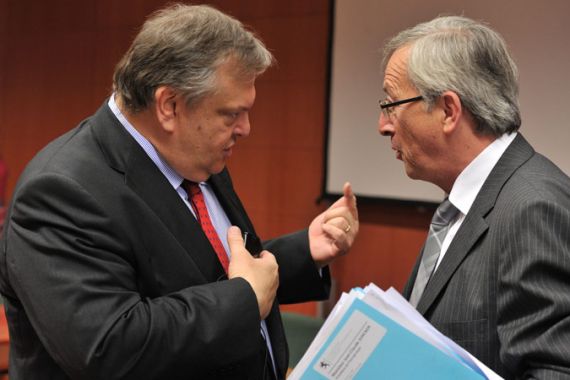Eurozone pledges new Greek debt crisis aid
Eurozone finance ministers end meeting in Brussels, avowing to keep Greek debt crisis from spreading to Italy and Spain.

European finance officials have pledged to bolster a rescue fund to end growing risks over Greece’s debt crisis possibly spreading and disrupting other fragile economies.
With the future of the euro hanging in the balance, European Union leaders and the 17 euro zone ministers met in Brussels on Monday, under pressure to cobble together a consensus over a second Greek bailout designed to ease the threat to the eurozone’s third and fourth biggest economies, Italy and Spain.
“[A bailout] is a fait accompli in principle but what they haven’t agreed yet is how it’s going to work in practice,” Al Jazeera’s Paul Brennan said from the sidelines of Monday’s talks in Brussels.
“A consensus is developing among the Eurozone, though, that Greece will have to be allowed to write off at least some of its debts. They have been resisting that until now, but it does look inevitable that they’ll have to write off some of it because they simply can’t pay it all.”
Sorting out the details
A senior EU source told the Reuters news agency that the finance ministers would discuss the option of buying back Greek debt, and explore a French plan that would involve private sector creditors rolling over around 70 per cent of their Greek debt into bonds and other securities.
Germany, and at least three other European governments, are determined that banks, insurers and other private holders of Greek bonds should bear a portion of the costs of a second Greek bailout, which could exceed $157bn.
“What we’re looking at most probably is some sort of debt swap arrangement where they agree to continue extending a line of credit to Greece not just for three years but perhaps for an extra seven years,” our correspondent said.
“It doesn’t solve the problem but it does buy time, and it looks like that is the favoured option at this time.”
|
Gerald Tan takes a look at the actual size of Greece’s debt |
Europe’s finance ministers and policymakers will begin negotiations amid fresh worries that other nations could be affected by the Greek crisis and that a further delay in putting together a second bailout could sink investor confidence in weak economies around the region.
After weeks of negotiations with bankers, however, there has been little progress on cementing a formula that is acceptable to all sides.
“We will get consensus, there’s no doubt about it, but whether it will be sort of hodge-podge solution or a strong single-minded solution remains very much up to the delegates,” Brennan said.
A spokesman for Herman Van Rompuy, the president of the European Council, described the high-level meeting between Van Rompuy, Jose Manuel Barroso, the European Commission president and Olli Rehn, the EU economic and monetary affairs commissioner, as a “co-ordination [meeting], not a crisis meeting”.
He said Italy was not on the agenda but senior EU sources said it would be impossible not to discuss it just days after a large sell-off in stocks and bonds that the Italian media have dubbed “black Friday”.
The cost of insuring Italian debt against default jumped to a record high on Monday, which bankers say
will start putting heavy pressure on Italy’s finances.
The sell-off has increased fears that Italy, with the highest ratio of sovereign debt to GDP in the eurozone after Greece, could be dragged into crisis.
The eurozone’s existing rescue mechanism could have insufficient funds to help in such a scenario.
German newspaper Die Welt quoted an unnamed ECB source as saying the European bailout fund may have to be doubled to 1.5 trillion euros to provide aid to Italy.